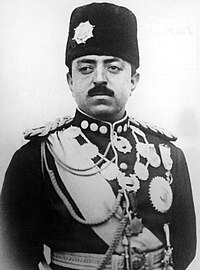Amanullah Khan
| King Amanullah I Pashto: أمان الله خان, Dari: أمان الله خان, Urdu: أمانالله خان |
|
|---|---|
| King of the God granted Kingdom of Afghanistan and its dependencies | |
 |
|
| Sovereign Prince of Afghanistan | |
| Reign | 28 February 1919 – 9 June 1926 |
| Predecessor | Prince Nasrullah I |
| Successor | Himself (as King) |
| King of Afghanistan | |
| Reign | 9 June 1926 – 14 January 1929 |
| Predecessor | Himself (as Sovereign Prince) |
| Successor | King Inayatullah I |
| Born |
1 June 1892 Paghman, Principality of Afghanistan |
| Died | 25 April 1960 (aged 67) Zürich, Switzerland |
| Burial | Jalalabad, Afghanistan |
| Spouse | Soraya Tarzi |
| Issue |
See
|
| House | Barakzai |
| Father | Prince Habibullah I, Prince of Afghanistan |
| Mother | Sarwar Sultana Begum |
Amanullah Khan (1 June 1892 – 25 April 1960) was the Sovereign of the Kingdom of Afghanistan from 1919 to 1929, first as Emir and after 1926 as Malik (King). After the third Anglo-Afghan War, Afghanistan was able to pursue an independent foreign policy free from the influence of the United Kingdom, and his rule was marked by dramatic political and social change. He was the first Afghan ruler who attempted to modernize Afghanistan on Western designs. However, he did not succeed in this because of a popular uprising by Habibullah Kalakani and his followers. On 14 January 1929, Amanullah abdicated and fled to neighbouring British India whilst the country went into a short civil war. From British India he went to Europe where he died in Zürich, Switzerland, in 1960.
Amānullāh Khān was born on 1 June 1892, in Paghman near Kabul, Afghanistan. He was the third son of the Emir Habibullah Khan. Amanullah was installed as the governor of Kabul and was in control of the army and the treasury, and gained the allegiance of most of the tribal leaders.
Russia had recently undergone its Communist revolution, leading to strained relations between the country and the United Kingdom. Amanullah Khan recognized the opportunity to use the situation to gain Afghanistan's independence over its foreign affairs. He led a surprise attack against the British in India on 3 May 1919, beginning the third Anglo-Afghan war. After initial successes, the war quickly became a stalemate as the United Kingdom was still dealing with the costs of World War I. An armistice was reached towards end of 1919, and Afghanistan was completely free of British influence.
...
Wikipedia
